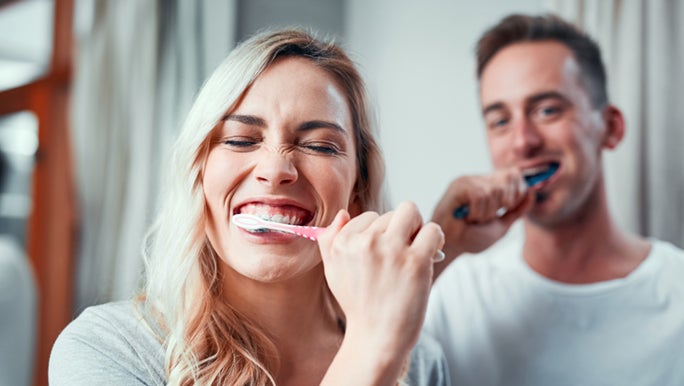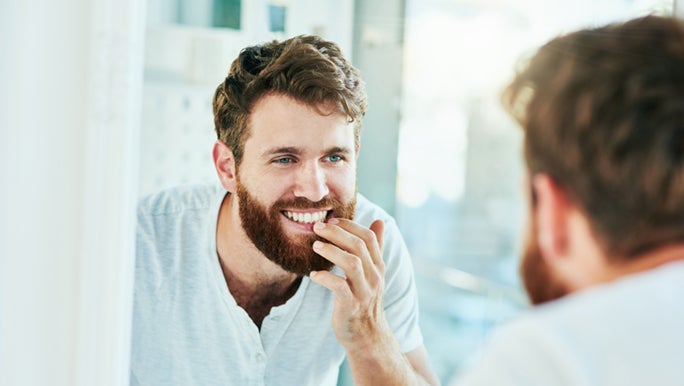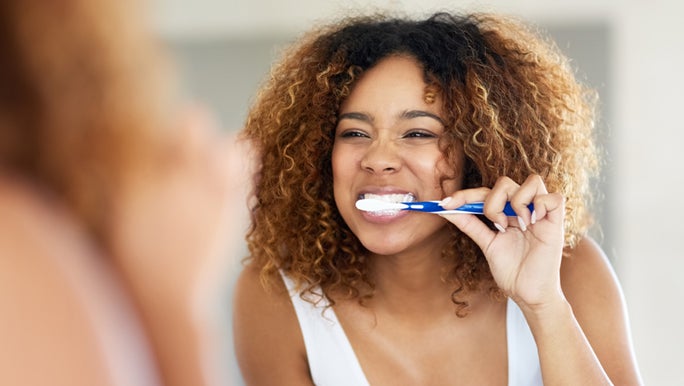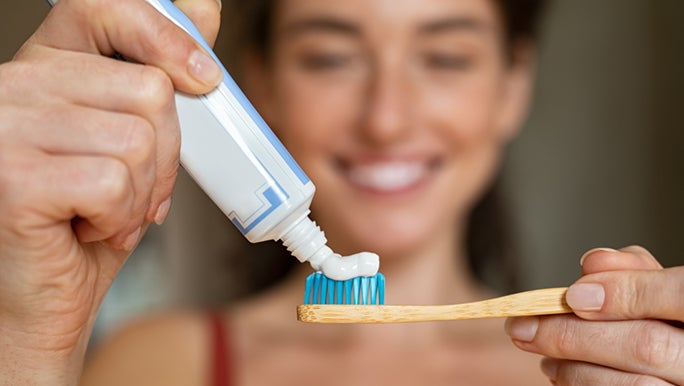Key Points
- When and how you brush your teeth is important.
- It’s absolutely possible to whiten your teeth, but watch out for foods that stain them.
- Teeth sensitivity could be from a highly acidic diet, teeth grinding, or stress-related behaviours.
- Brushing your teeth alone may only remove up to 60% of plaque.
We’ve all dreamt of a brighter smile and wondered how to achieve those pearly whites. Some people ask whether there are any foods that whiten teeth, while others just want to avoid staining them. And, of course, there’s the question of when it’s best to brush your teeth – before breakfast? afterwards? how about at night? – plus how, and for how long?
Uncertainty about oral health is super common, so we asked expert dentist, Dr Reuben Sim, for his thoughts.
Is it best to brush your teeth before or after breakfast?
Does when you brush your teeth in the morning make a difference? According to Dr Reuben, it does.
He says that this is because your saliva production drastically decreases when you sleep. “This means the bacteria that hide out in plaque build-ups can start to compound in your mouth, which may increase tooth decay.”
These bacteria can do more than just lead to morning breath, Dr Reuben explains. They also break down any sugars they find into acids that can attack your gums and tooth enamel. “Over time,” he adds, “this can lead to dental problems.”
Brushing and flossing as soon as you wake up gets rid of any plaque that accumulated overnight, plus any bacteria hiding out in it.

Brushing and flossing as soon as you wake up takes care of any plaque that has accumulated overnight
Which foods stain your teeth?
Wondering whether tea stains your teeth? What about coffee or turmeric? Dr Reuben has a simple rule of thumb when it comes to tooth discolouration. “If something stains a white shirt when you spill it, it will stain your teeth too.”
He recommends watching out for common teeth-staining culprits, including:
- both tea and coffee
- red wine
- soft drinks
- tomato-based sauces
- soy sauce
- balsamic vinegar
- some fruits and berries
Dr Reuben suggests maintaining good brushing and flossing habits. He says that this is especially important for 24-72 hours after teeth whitening treatments, when your teeth are most susceptible to stains.

It’s best to talk to your dentist to find the most suitable teeth whitening solution for you
Is it possible to whiten your teeth overnight?
Dr Reuben says it’s definitely possible, thanks to two key ingredients: hydrogen peroxide and carbamide peroxide. These ingredients can be found in teeth whitening treatments from your dentist and in some common whitening toothpastes and whitening treatments sold over the counter.
The best ingredient and teeth whitening method for you will depend on your personal situation, so it’s important to discuss your options with your dentist. “Neither ingredient works better than the other,” comments Dr Reuben.
He explains that hydrogen peroxide whitens faster, but it may cause more sensitivity. Meanwhile, carbamide peroxide takes longer and can cause less sensitivity, so it may be more suitable if you want to whiten your teeth overnight.

Brushing your teeth twice a day with a soft or medium bristle brush and fluoride toothpaste for at least two minutes is recommended
Why do teeth get sensitive?
If tooth sensitivity means you’re missing out on enjoying some foods, Dr Reuben says it could be due to one of four common reasons:
- A dental condition: the obvious answer is that you may have a dental issue like a cavity or gum recession that exposes a nerve. This isn’t the only possibility, but it does mean it’s important to reach out to your dentist quickly if you notice any new sensitivity.
- Too much acidity: a highly acidic diet can erode your tooth enamel, which can also lead to sensitivity.
- Teeth clenching or grinding: Dr Reuben comments that this can result from stress, but can also just be a subconscious or sleep-related behaviour. Either way, it can wear down tooth enamel and bruise tooth ligaments.
- Poor brushing techniques: brushing too hard or using an abrasive toothbrush can also strip away your tooth enamel.
How to brush your teeth: Dr Reuben’s top 5 tips
Dr Reuben’s top five oral hygiene essentials are:
- Brush your teeth TWICE a day for at least two minutes, using a soft or medium bristle brush and fluoride toothpaste. “Research suggests that fluoride toothpaste can help to decrease tooth decay tremendously,” Dr Reuben explains. And, for most people, medium or soft bristle toothbrushes are best, according to Health Direct, the national virtual public health information service.
- Floss thoroughly every day. “Brushing only covers about 60% of tooth surface areas,” he comments. “Flossing covers the rest.”
- Use the right technique. Dr Reuben recommends short, tooth-wide strokes with your brush angled at 45 degrees from your gums for the best clean.
- Choose the right shaped toothbrush, and replace it regularly. Look for a toothbrush that reaches back to your farthest teeth and fits into hard-to-reach places in your mouth. Then replace it every 3-4 months. “Old, frayed bristles will struggle to remove plaque,” Dr Reuben warns.
- Eat well: a well-balanced diet with plenty of nutrient-rich foods may help you have healthy hair, skin and nails, and the same is true for your gums and teeth. Where possible, also limit highly acidic foods and drinks or products with added sugar that may contribute to tooth decay.

Replace your toothbrush every three or four months
A little attention now can avoid big problems later
We’re all guilty of occasionally neglecting our teeth or forgetting to schedule an important dental appointment.
Life gets in the way, but putting in the effort now can help to avoid preventable dental problems later, which is part of looking and feeling your best. That’s why it’s important to schedule in regular dental check-ups. Your smile will thank you for it.
Related:
Dr Reuben Sim is an associate dentist who specialised in implant, cosmetic dentistry and orthodontics. His interests in these areas have led him to travel and study new techniques all around the world.
Reviewed by the healthylife Advisory Board November 2021.




